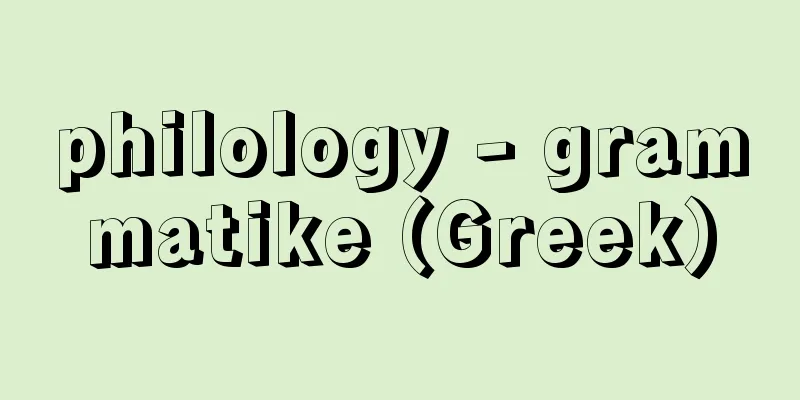philology - grammatike (Greek)

|
An academic field and methodology that seeks to understand the totality of language that has been preserved and passed down in documents. In reality, the documents it deals with are primarily classical works written in ancient Greek and Latin, and among these, literary works are the focus. Unlike linguistics, its goal is to understand documents from classical antiquity as coherent, meaningful discourses, and as a prerequisite, it examines the process by which the text of the document has been transmitted, and places emphasis on the procedure of determining the authentic reading of each part from among various alternative readings. Therefore, in the modern era, when the field became specialized, the name "philology" has become roughly synonymous with textual revisionism, and the aspect of interpreting classical works is positioned only as one means of determining the text. The origin of philology in ancient Greece was closely related to the spread of books. After the classical period, literary works that would become classics and be passed on to future generations were prepared, and books became widespread. Among them, Aristotle systematically collected documents in all academic fields, becoming the first verifiable book collector in ancient Greece. In the Hellenistic period, under the Ptolemy dynasty, Alexandria in Egypt occupied the political center of the Greek world and became important as a colony of Greek culture that spread among different ethnic groups. Books were no longer mere notes, but came to be respected as the basis of the orthodox classical Greek cultural tradition. In particular, the epics of Homer, which formed the foundation of Greek culture, were originally oral literature, and the texts were in a state of flux, with many variant versions found throughout Greece. Under royal patronage, the Mouseion, a research institute with a large library, was established in Alexandria, and philologists, specialists in the field of "grammatice" (the study of written matter), emerged. Among the scholars who worked hard to confirm the text of Homer, Zenodotus, Aristophanes, and Aristarchus are well known. In the Roman and Middle Ages, the inheritance of the classics was given great importance, and philology was limited to the commentary of the classics, but in the Renaissance, a return to the source was sought, and the restoration of classical works to their original state was also emphasized. During this period, the name "philologia" came to refer not only to philology but to literary research in general, and the establishment of textual revisionism, which was followed by Poliziano, Scaliger, and Karl Lachmann (1793-1851) in the 19th century, began with the return to the source during the Renaissance. On the other hand, the trend of "neo-humanism" in modern Germany emphasized the tendency toward synthesis. The idea of philology as a synthesis of various sciences originally arose from the self-defense of Eratosthenes, a universalist in the Hellenistic period, but there was also an example of Budé proposing it as a liberal arts ideal in the Renaissance. The ideal of a comprehensive understanding of classical ancient culture preached by Winckelmann was inherited by the German classicists Friedrich August Wolf (1759-1824) and August Böckh (1785-1867) as the idea of Altertumswissenschaft (Ancient Studies), which was distinguished from traditional philology. Although he focused primarily on philology, this liberal arts ideal was also advocated as an ideal by the 20th century classicist Ulrich von Wilamowitz-Moellendorff (1848-1931). Modern European languages are sometimes grouped together by family, and a separate academic field is established for each of them, such as Slavic, Germanic, and Romance languages, and the term "philology" is also sometimes used to refer to non-European languages. [Hideo Katayama] Source: Shogakukan Encyclopedia Nipponica About Encyclopedia Nipponica Information | Legend |
|
文書に残って伝承されていることばの総体を理解しようとする学問分野および方法論。現実には対象となる文献はもっぱら古代ギリシア語、ラテン語で書かれた古典作品であり、そのなかでもとくに文芸作品が中心となる。言語学とは異なり、あくまでもまとまった意味のある言説として古典古代の文献を理解することを目的とし、その前提として、文書の本文(テクスト)の伝承過程を検討し、個別箇所における真正な読みを多様な異読のなかから確定する手続を重視する。したがって、専門分化した近代以後の名称としては、「文献学」は本文校訂論とほぼ同義となり、古典作品の解釈という側面は、本文確定のための一手段としてのみ位置づけられる。 古代ギリシアにおける文献学の起源は、書物の普及と密接に関連していた。古典期が過ぎると、後世に伝達すべき古典となる文学作品が整い、書物が普及していった。そのなかでアリストテレスは、あらゆる学問分野について体系的に文書資料の収集を行い、古代ギリシアにおいて確認できる最初の収書家となった。ヘレニズム時代に入り、プトレマイオス王朝下にエジプトのアレクサンドリアがギリシア世界の政治的中心を占め、異民族間に浸透したギリシア文化の植民地としても重要になると、書物はもはや単なる覚え書きではなくなり、正統な古典ギリシア文化の伝統のよりどころとして尊重されるようになった。とくにギリシア文化の基盤をなしていたホメロスの叙事詩は、もともと口誦(こうしょう)文学であったという事情を反映して、本文が流動的状態にあり、ギリシア各地に多種の異本が認められた。王家の庇護(ひご)によりアレクサンドリアには大規模な図書館を伴った研究機関ムーセイオンが設立され、「グランマティケー」(書かれたものに関する学)の専門家である文献学者が出現した。ホメロスの本文を確定するために尽力した学者たちのなかで、ゼノドトス、アリストファネス、アリスタルコスが著名である。 ローマ時代および中世には、もっぱら古典の継承が重視され、文献学もおもに古典の解説に終始したが、ルネサンス時代に至ると、源泉への回帰が志向されるなかで、古典作品もその原状態の回復が重視されるようになった。この時代に「フィロロギア」の名称が文献学のみならず文学研究全般をさすようになったが、ポリツィアーノ、スカリジェルを経て、19世紀のラハマンKarl Lachmann(1793―1851)に連なる本文校訂論の確立は、ルネサンスの源泉回帰を発端としている。 他方、近代ドイツの「新人文主義」の潮流においては、総合への志向が強調された。諸学の総合としての文献学という理念は、元来はヘレニズム時代の万学の学者エラトステネスの自己弁護から生じたものだが、ルネサンス時代にもビュデが教養理念として掲げた例がある。ウィンケルマンの説いた古典古代文化の総合的理解の理想は、ドイツの古典学者ウォルフFriedrich August Wolf(1759―1824)やベックAugust Böckh(1785―1867)によって旧来の文献学と区別された「古代学」Altertumswissenschaftの理念へと受け継がれた。あくまで文献学に主眼を置いたうえではあるが、この教養理念は、20世紀の古典学者ウィラモウィッツ・メーレンドルフUlrich von Wilamowitz-Moellendorff(1848―1931)によっても理想として掲げられた。 近代ヨーロッパ諸言語を系統ごとにまとめて、スラブ語、ゲルマン語、ロマンス語等のそれぞれの「文献学」を学問分野として設定することがあり、さらには非ヨーロッパ系言語を対象とするものにも「文献学」の名称が転用されることがある。 [片山英男] 出典 小学館 日本大百科全書(ニッポニカ)日本大百科全書(ニッポニカ)について 情報 | 凡例 |
<<: Literature Review - Bunkentsukou
Recommend
Cicatrization - Hankonbunshin (English spelling)
A type of body modification, a custom in which the...
Yongle coins
A Chinese currency, Yongle Tongbao. A copper coin...
Public Service - Regret
〘noun〙 ("ku" is the Go-on pronunciation ...
Malfatti, G.
...He completed the formula for binomial expansio...
Paul Gerhardt
1607‐76 German hymn poet second only to Luther. He...
Kawaguchi-so
A manor in Sakai County, Echizen Province. It is b...
American Express Co.
The world's largest American travel agency. It...
ADH
Antidiuretic hormone Source : Internal Medicine, 1...
Sint-Martens-Latem (English spelling)
…Fauvism was represented by the sculptor Wouters,...
Chanhu daro (English spelling)
Located near Sakland in the Nawabshah district of ...
Silver Chloride - Enkagin
AgCl (143.32). It occurs naturally as serrulite. ...
Tenmei Kyoka
Kyoka poetry centered on the late Edo Tenmei perio...
Ankle - Ankle
〘noun〙 The bony protrusions on either side of the ...
District Court - Kusaibansho
A court established by the 1872 Judicial Duties Re...
Gas miscible attack - Gas miscible attack
…Recently, more complex methods have been used to...

![Gunkeel Punzum I [peak] - Gunkeel Punzum](/upload/images/67d031936d009.webp)







